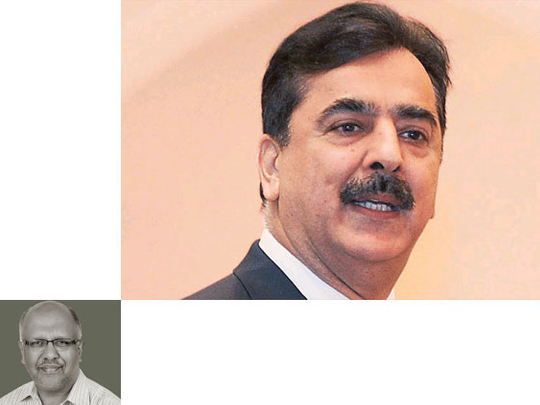
When Pakistan's Prime Minister Yousuf Raza Gilani appears before the country's Supreme Court tomorrow to face contempt of court charges, his own political future will be on the line. If convicted, in the very extreme, the prime minister could face a jail sentence.
But the assured survival of the country's ruling structure led by the Pakistan People's Party (PPP) of President Asif Ali Zardari and Gilani says little about the multiple crises that surround Pakistan. The ruling structure is already set to demonstrate a simple majority in parliament giving the assurance of electing a new prime minister if need be.
The past four years, since the present government came to power, have vividly shown Pakistan's growing and deepening crisis of governance that goes back to events of more than a decade. The near collapse of governance across the country has essentially meant that Pakistan has become a free for all country, unable to pull itself together for the best interests of its people.
Though an acute worsening of lawlessness in the tribal areas that border Afghanistan has been well documented, there appears to be an equally acute crisis in many other parts of Pakistan. Anecdotal evidence suggests that not only have militants such as religious hardliners contributed to the lawlessness but also equally important has been the role of the country's notorious police force, where criminality runs at an all-time high.
The root cause of Pakistan's present state of affairs lies in part in the ill-conceived programme of devolution undertaken by former president General Pervez Musharraf. In his zeal to become a popular figure, Musharraf oversaw a systematic dismantling of a well-placed administrative structure at the grass roots, replacing it with a system of elected representatives.
Though the move was undertaken to provide the right of representation to the people of Pakistan, it has only unleashed a nightmare of unparalleled proportions. Consequently, widespread corruption in Pakistan's small towns, associated with politicians elected under the devolution system, has now become the norm.
Unhelpful trends
Though Zardari and Gilani may not be responsible for unleashing this terrible experiment on Pakistan's democracy, their utter failure is more the result of their inability to reverse a worsening trend. While locked in futile battles with players like the Supreme Court, Pakistan's present-day rulers have only seen the worst possible slide in the quality of governance.
As a consequence of the failure of Pakistan to improve governance, the country has become surrounded by a number of unhelpful trends. While the economy continues to suffer badly, the government's ability or determination to reverse this trend, remains in question. Unlike just a few years ago when Pakistan saw an emerging uptake in new investments, the present regime has only overseen the worst possible downturn in investments. Other areas of reforms, notably the matter of widening Pakistan's chronically narrow tax base, have also been the subject of continued neglect. In this background, the survival of politicians like Zardari and/or Gilani is largely inconsequential for the future of Pakistan.
This year Pakistan will likely go through its next set of parliamentary elections that will give its people the chance to elect their next government. Ahead of the polls, a sharpening of the political divide is obvious as the main opposition and pro-government political parties prepare for what may become a viciously contested campaign.
While anti-government political groups eagerly take pot shots at Zardari, Gilani and the PPP on matters like corruption, they have dismally failed to present an alternative vision for the future of Pakistan.
Unless Pakistan's mainstream political parties rally behind the cause of tackling one of the worst slides in the country's quality of governance, even the election of a new government will remain inconsequential.
Farhan Bokhari is a Pakistan-based commentator who writes on political and economic matters.










